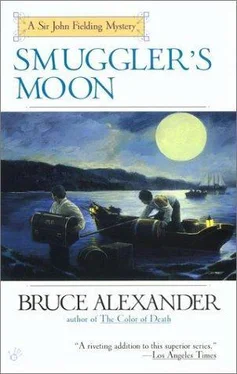Bruce Alexander - Smuggler's Moon
Здесь есть возможность читать онлайн «Bruce Alexander - Smuggler's Moon» весь текст электронной книги совершенно бесплатно (целиком полную версию без сокращений). В некоторых случаях можно слушать аудио, скачать через торрент в формате fb2 и присутствует краткое содержание. Жанр: Исторический детектив, на английском языке. Описание произведения, (предисловие) а так же отзывы посетителей доступны на портале библиотеки ЛибКат.
- Название:Smuggler's Moon
- Автор:
- Жанр:
- Год:неизвестен
- ISBN:нет данных
- Рейтинг книги:4 / 5. Голосов: 1
-
Избранное:Добавить в избранное
- Отзывы:
-
Ваша оценка:
- 80
- 1
- 2
- 3
- 4
- 5
Smuggler's Moon: краткое содержание, описание и аннотация
Предлагаем к чтению аннотацию, описание, краткое содержание или предисловие (зависит от того, что написал сам автор книги «Smuggler's Moon»). Если вы не нашли необходимую информацию о книге — напишите в комментариях, мы постараемся отыскать её.
Smuggler's Moon — читать онлайн бесплатно полную книгу (весь текст) целиком
Ниже представлен текст книги, разбитый по страницам. Система сохранения места последней прочитанной страницы, позволяет с удобством читать онлайн бесплатно книгу «Smuggler's Moon», без необходимости каждый раз заново искать на чём Вы остановились. Поставьте закладку, и сможете в любой момент перейти на страницу, на которой закончили чтение.
Интервал:
Закладка:
Reader, I hasten to add that Sir John was speaking in jest.
TEN
Mr. Patley managed to embarrass me with his description of my part in the battle at the crossroads. ”Not only did he load for me,” said he to all, ”he guarded my arse like it was the King’s own. Kilt three of them, as I believe.” I’m glad to say that he was wrong about that: I killed no one, though I wounded two. This we discovered in our final accounting, as we herded the prisoners into the open wagon, hands tied behind their backs. Him I had shot last had to be lifted with care onto the floor of the wagon, nor could he be tied, as the others were; yet so weak was he from the shoulder wound I had given him that he could scarce move there in the wagon bed. It did not please me to look upon him thus-though he would have happily murdered us, had I but given him the chance.
Included in that group of prisoners loaded into the open wagon were two taken by the King’s Carabineers from that fourth wagon which had turned about and run, thinking to flee whilst our attention was elsewhere. Yet just as Sir John had predicted, they were caught and brought back by Lieutenant Tabor and his men.
All were together now, and ready to travel. Mr. Perkins drove the open wagon, and constables Bailey and Patley sat at either end, guarding the prisoners. Three of Lieutenant Tabor’s troopers drove the remaining wagons, and we-Sir John and I-rode back to Deal in Mick Crawly’s hackney coach. We went in caravan, Mr. Crawly leading the way, obviously relieved that neither his coach, nor his horses, had suffered a scratch during the encounter. All this took time, of course. It was about two o’clock when we set out on our return journey. Knowing that it would be near an hour before we reached Deal, I thought to learn more from Sir John of what lay ahead. I had, for instance, no notion of where, precisely, we were headed. Nor did I know what next he might be contemplating. To these and other like questions I hoped to learn the answer, and I was bold enough to believe that because of my conduct under fire (as it were) I was entitled to them. Vain expectation!
Once we were underway, I put that first question to him in the manner of a helpful warning. ”I do hope, Sir John,” said I, ”that you do not intend to install all these prisoners at the inn. They would be easily rescued from there. Do, please, remember what happened when last prisoners were locked up there.”
“I am not likely to forget, Jeremy,” said he to me. ”And in answer to your question, no, I do not intend to install them there.”
“Well … where then?”
“That you will learn in due course. You acquitted yourself well on this night. You must be tired. Why not take a rest? That is what I intend.”
So saying, he folded his arms over his capacious belly, leaned back in his corner of the seat, and made ready to doze.
“Am I to be the only one among us all who does not know where we are headed?” I asked in frustration.
“Oh, by no means,” said he, ”I’m sure our prisoners have no inkling of our destination.”
I could but sit in silence, musing upon the events of the night, rehearsing over and over again in my mind that minute (or hardly more) in which all the shots were fired and all the damage done. What I had seen and done in that time repeated dreamlike until at last, lulled by the rocking of the coach, I fell into a dreamless sleep. Whether or not Sir John truly slept during that time I cannot say.
Just as the movement of the coach had put me to sleep, its cessation roused me: the sudden loss of motion brought me up and out of my seat, blinking in the dark, attempting to see where we had stopped.
“Calm yourself, Jeremy,” urged Sir John. ”We have arrived. Now you’ll have the answer to the question that so plagued you.”
Indeed I did. The site beyond the window was lit well enough for me to see it exact-and I did truly recognize it, for I had been there only hours before. I was looking at the arched entry into Deal Castle just as the last of the smugglers’ wagons, filled with contraband goods, disappeared inside.
A knock came upon the door at the far side of the coach. I slid across the seat and threw it open. There stood Dick Dickens, appearing far more eager and energetic than I felt at that moment.
“Sir John!” said he in an enthusiastic manner which well matched his bright appearance.
“Is it you, Mr. Dickens?” responded Sir John.
“It is, sir, and I see that all went as you wished.”
“Not quite all, there were two dead and two wounded among the smugglers, and I would not have wished that. But in the main, I would say that our operation was a success. But tell me, are you ready for us?”
“Just as I said when last we talked. I can supply storage space for the goods in the wagons. And Deal Castle, like any such, has a place for prisoners.”
“A proper dungeon, eh?” asked Sir John. ”You needn’t keep them in comfort.”
“They’ll find little of it here.”
“Good. I want them good and miserable when I come to question them. But what about the problem of the wagons and the horses? Have you solved that?”
“Yes, I’m sure we have. Once we get the wagons unloaded, I’ll have four of my men take them out to a farm outside of town. The owner is someone I trust, and he’s agreed to store the wagons as long as necessary and feed the horses with his own as well.”
“Can you get them out there before daylight? All this must be done in secret, just as I’ve said. I’ll need about twenty-four hours.”
“Oh yes. Believe me, sir, it is also in my interest that all this be kept utterly quiet. If George Eccles should get wind of this …”
“We’re in complete agreement then,” said Sir John, offering his hand. ”Look for me back here sometime toward noon.”
Mr. Dickens clasped it with his own and gave it a firm shake.
“Till then, sir,” said he.
With that, he shut the coach door, and with a word to Mick Crawly, he sent us off to Middle Street.
“Do you trust him?” I asked Sir John, putting it to him bluntly.
“Yes, I do,” said he. ”He has proven himself many times over. You see, Jeremy, he used this long period of inactivity to put into operation a truly formidable intelligence system. He can tell you whoever in Deal is involved in the smuggling trade-and to what extent. If I were asked-and I may be-who should have George Eccles job, I would say it should be Dick Dickens.”
“This in spite of his criminal past?”
“People change, Jeremy. Oliver Perkins changed, as you well know. And I have heard from him that Mr. Dickens’s story is even more dramatic than his own.”
“Oh?” said I-ever the skeptic at that time of my life.
“And how was that?”
“Well, it seems that whilst he was in Newgate, awaiting trial for violation of the excise laws-that is, for smuggling-he managed to write a letter and get it smuggled out and delivered.”
“That was bold of him,” said I.
“Far bolder than you think, for the letter was written and delivered to the Chancellor of the Exchequer. And boldest of all was its content, for in the letter, Dickens set about criticizing the mode of policing our coasts against smuggling. Not only did he tell him what was wrong, he took it upon himself to tell the Chancellor how it might be put right. The remarkable thing was that what Dickens put forth was all quite practical and helpful. He went so far as to suggest that there were other matters he would communicate, if given the chance. ”
I laughed aloud at that, so taken was I by the fellow’s audacity.
“He was, in effect, asking for a pardon,” said I.
Читать дальшеИнтервал:
Закладка:
Похожие книги на «Smuggler's Moon»
Представляем Вашему вниманию похожие книги на «Smuggler's Moon» списком для выбора. Мы отобрали схожую по названию и смыслу литературу в надежде предоставить читателям больше вариантов отыскать новые, интересные, ещё непрочитанные произведения.
Обсуждение, отзывы о книге «Smuggler's Moon» и просто собственные мнения читателей. Оставьте ваши комментарии, напишите, что Вы думаете о произведении, его смысле или главных героях. Укажите что конкретно понравилось, а что нет, и почему Вы так считаете.












